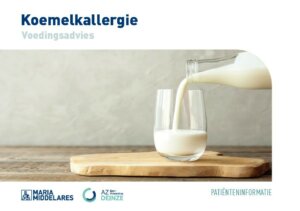Cow's milk allergy
An allergy is an adverse reaction of the immune system to certain, generally safe, food proteins (allergens), such as cow's milk.
In young children, the most common food allergy is to cow's milk. Since toddlers' intestinal wall is not fully mature, undigested cow's milk protein can pass through this wall and into the bloodstream. Some toddlers' bodies react to this protein by making antibodies.
Symptoms and causes
Symptoms and causesThis reaction can vary greatly and ranges from skin reactions to respiratory, oral, throat, stomach and intestinal reactions. The symptoms can manifest within a few minutes or up to one or two days after the allergen was consumed. Sometimes even mere traces of the allergen can lead to a reaction.
Diagnosis and treatment
Diagnosis and treatmentThe only treatment for a cow's milk allergy is to completely eliminate the cow's milk protein from the diet. See the leaflet below for more information about:
Only available in Dutch:

Voedingsadvies bij een allergie voor koemelk
DownloadTreatment centres and specialisations
Treatment centres and specialisationsLatest publication date: 02/08/2024
Something wrong or unclear on this page? Report it.







